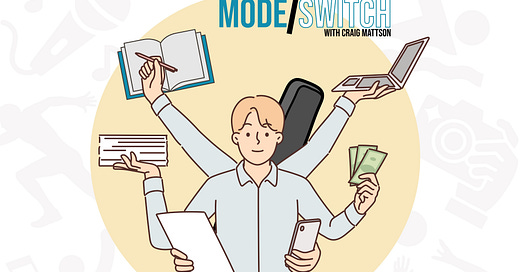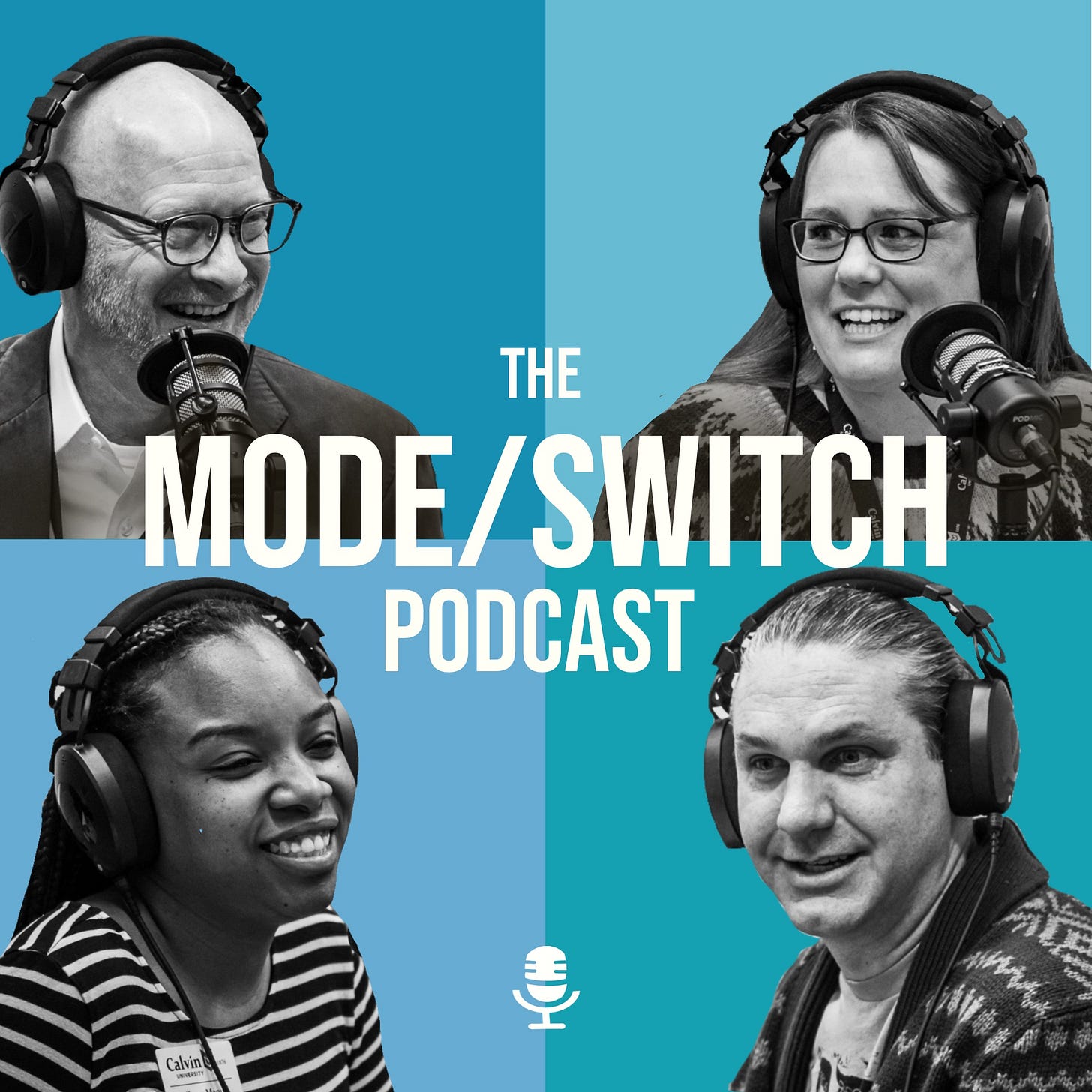Why's Everybody Got a Side Hustle?
Learning to love the vocational distractibility of rising professionals
An old Greek story tells of a bandit named Procrustes, a sociopath who pretended to be a hospitable fellow, happy to provide lodging to whatever tired travelers passed his way. His hotel featured an iron bed with everybody’s exact sleep number. The bed, he assured them, would match guest proportions exactly. The truth was far less comfortable and far more gruesome. When a short person lay down on the bed, Procrustes would spring into the darkened room and grab his victim by the legs and the arms, stretching them till they were the same length as the bed. For overly tall guests, Procrustes would use an axe to lop off any legs and arms beyond the edges of the bed.
I thought of this story recently while reading about American over-employment. We used to ask the question, “So what do you do?” at parties, expecting one and only one answer. I’m an engineer. I’m a teacher. I’m a veterinarian. But now those “Immas” are getting complicated, as more and more Americans are taking on extra jobs to pay the bills. We used to call that “moonlighting,” and it was frowned upon, sometimes even forbidden, like the extra limbs Procrustes would chop off his guests.
These days, everybody’s doing second jobs. Gen Z professionals, especially, are doing extra work alongside their main jobs. But every generation’s doing it, honestly. Here’s a U.S. Labor and Statistics graph showing the rising number of multiply employed Americans.
Journalism on this point tends towards hype. “America has failed millennials so badly they’re turning to $1,000-per-month side hustles to make ends meet,” reads one rather excitable headline. Gen Xers, too, have joined the “over-employment community.” I loved the thrilling possibilities in this headline: “A Gen Xer who secretly works 3 full-time remote jobs and makes $344,000 paid off his mortgage and is saving to send his kids to college debt-free.”
Do all these multiple jobs indicate economic shortfall? Very often. How else is a body supposed to pay tuition bills, credit card debts, car payments, and inflated milk prices on a single salary? Better drive you some Uber. But sometimes, people do extra work simply because they like to work. (I seem to be writing this newsletter at 5:30 on a Saturday morning for that reason.) Now, we’re not talking about an extra job; we’re talking a side hustle. In fact, American over-employment requires a whole new new lexicon in response to the so-whaddya-do question:
Gig: extra work that pays immediately. (Think, driving Lyft or Grubhub.)
Side hustle: extra work that might not pay immediately, but which may pay eventually. (Think, YouTube influencer.)
Passion Project: extra work that might never get you anything except, you know, a sense of ultimate purpose. (Think, high school social enterprise to create solar-powered, um, box fans for developing-world citizens.)
This week’s question is for millennial managers:
How should you deal with the over-employment of your Gen Z team members?
Should you urge them to show more enthusiasm for your company mission? Should you go all Procrustes on them, yanking and tugging head and foot to force them to fit their jobs? Should you enforce a stricter moonlighting policy that hacks off extra jobs like so many limbs?
Here’s the mode switch I’m recommending: stop looking at people as rational economic units and start looking at them as the three-dimensional humans they are.
The phenomenon of the side hustle invites an overly simple narrative: The humans take a job; the humans realize the pay’s too low; the humans take another job to compensate. But the truth about your people, before and after work, is far more complicated than that. Here are some stories from my own research among quarter-life profesionals that changed my mind about how many motivations drive over-employment. (I’ll alter their names but not the stories.)
Brice was a worship pastor who was running a brand company on the side. Eventually, he quit the pastorate, and did the side hustle full time—by hiring out other young professionals who did gig work for him as one of their side hustles.
Krista was a physical therapist assistance who had once tried to weave her love of art and her need for money into a single profession (by being a wedding photographer). After burning out, she turned to physical therapy. But she missed the art, so one of her side projects—pottery—became her main job.
Right out of college, Robert was living her best life, doing the theatre that she loved and that she had trained for. But after getting harassed by coworkers, she left her passion project job and went to work in corporate America. She now does quite well for herself in a meaningless job. To compensate, she directs college theatre as a side hustle.
Bert also works in corporate, doing PR in a major Chicagoland firm. He enjoys the work of managing a small team. But he also runs a small social enterprise after hours that assists other small companies in the work of branding.
Christopher has worked in politics for years, serving as a deputy campaign director for a gubernatorial campaign. But he and his spouse have started a nonprofit of the millennials by the millennials and for the millennials.
Notice that sometimes the side job fills in for what the main job fails to provide. But notice, too, that the side job can also become the main job. Other times, people give up on the side job and settle for the main job. And still other times, it’s not clear which is the gig and which is the job. My takeaway? Eventually the over-employment lexicon breaks down. The gig becomes the job, which requires the side hustle, which becomes the passion project, which becomes the full-time job.
When it comes to work, humans can’t be explained by any one set of hankerings.
Each of these texts talks about the phenomenon of the side job from economic, existential, or even theological angles. They each offer workshops on over-employment.
The historian and theologian Tom Wright has argued that people everywhere have intuitions that the world should be just and beautiful and spiritual and relational and free and so on and so forth. Everybody, he argues, feels these intuitions to be reliable guides, even when they turn out to be what he calls “broken signposts,” breaking our hearts by leading us nowhere. Still, these intuitions do a pretty good job explaining why we keep taking on so many jobs.
Work should be equitable, so screenwriters and auto workers go on strike.
Work should provide freedom, so lots of folk want to WFH.
Work should provide community, so people want Thursday happy hours.
Work should be spiritually meaningful, so we want time to meditate and do yoga.
Work shouldn’t be our religion, so we look for other more beautiful things to do after hours.
You get the point. When it comes to work and life, people intuitively want all the things.
The podcast Matter of Opinion has jokingly referred to work as “America’s disease.” We Americans hustle so much that Derek Thompson of the Atlantic accuses us of worshipping work. On the other hand, as Ross Douthat notes in Matter of Opinion, Americans don’t work as much as workers in some Asian countries, who hardly have time to have kids, nor are we as laid back as Europeans, whose economies are stagnating. Maybe, suggests Douthat, Americans strike a happy (if frenetic) medium.
I don’t know about that. Work seems out of whack six ways from Sunday. But I have to admit that the gig and the side hustle and the extra job do point to a gorgeous restlessness in human life. If you’re a millennial manager with a team of vocationally distractible Gen Z employees, don’t worry about forcing them into some perfect fit for the job you hired them for. Concede the cocktail of economic necessity and creative imagination that drives them to hustle. And don’t miss the fact that busy humans are blessed with an incorrigible sense that the world should be better than it is. They’re not wrong about that.
-craig
Each week, Emily, LaShone, David, Craig, and sometimes Andrea, chat up the newsletter’s issue with a Gen Z professional. Follow our convos on Spotify.








